PARTIA KOMUNISTE E SHQIPËRISË DHE BALLI KOMBËTAR GJATË MUAJVE GUSHT-SHTATOR 1943
COMMUNIST PARTY OF ALBANIA AND BALLI KOMBETAR DURING AUGUST-SEPTEMBER 1943
Author(s): Sonila BoçiSubject(s): WW II and following years (1940 - 1949), History of Communism, Fascism, Nazism and WW II
Published by: Qendra e Studimeve Albanologjike
Keywords: Communist party; Albania; Balli Kombetar; 1943;
Summary/Abstract: The months of August-September 1943 are a turning point in the relations between the belligerent Blocs of the World War II, which had an undeniable influence in Albania. The successes of the "Red Army" on the Eastern Front; the fall of Mussolini's government after the Badoglios’ coup, and above all the news spread by the Western Allies about the opening of the second front in the Balkans, changed drastically the attitudes of the political forces in Albania towards each other. The rivalry, problems and contradictions that had existed until then between the two largest non-fascist groups in the country: the Communist Party of Albania (CPA) and the National Forefront (Balli Kombëtar), were now turning into a fierce confrontation, all the way up to an armed conflict. Most scholars acknowledge that August 1943, especially the failure of the Mukje Agreement, brought about a drastic change in relations between the National Forefront and the CPA, and also in the resistance of the Albanians against the Italian and German invaders. The question of political power for both sides began to be discussed no longer as an issue that belonged to the future, but as a reality for which immediate solutions had to be found. It was the subject of political domination and the power of tomorrow that set these groups against each other. The difference between the two political formations lay in the methods of how they would achieve their long-term goals and the model of political system they proposed for post-war Albania. While the CPA aimed at a monistic political system, which was clearly expressed in the decisions of the Second Conference of the National Liberation Council, held in Labinot (4-8 September 1943), the National Forefront defended the idea of a multi-party democracy. This article focuses on the analysis of relations between the two political groups in Albania: CPA/NLM and National Forefront. It aims to analyze the reasons and factors that influenced the strained relations between them that ended in a civil war, which became one of the features of the history of World War II in Albania.
Journal: Studime Historike
- Issue Year: 2020
- Issue No: 03-04
- Page Range: 171-196
- Page Count: 26
- Language: Albanian
- Content File-PDF

